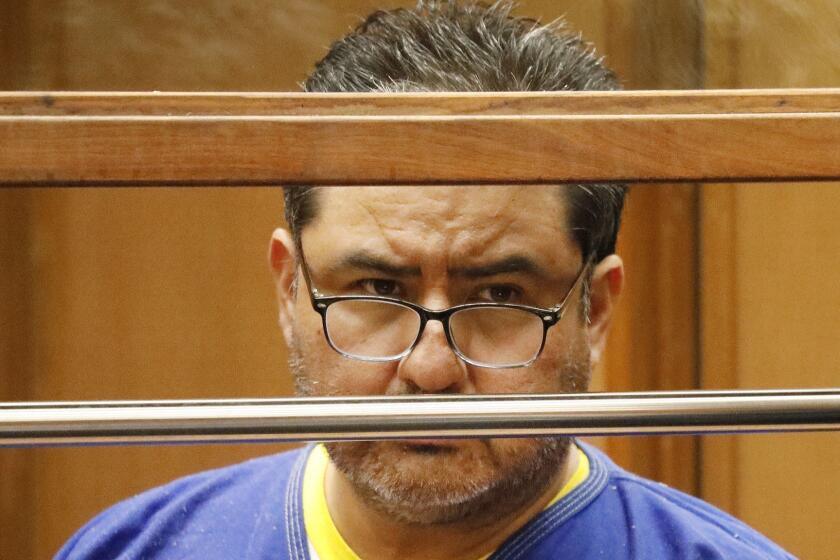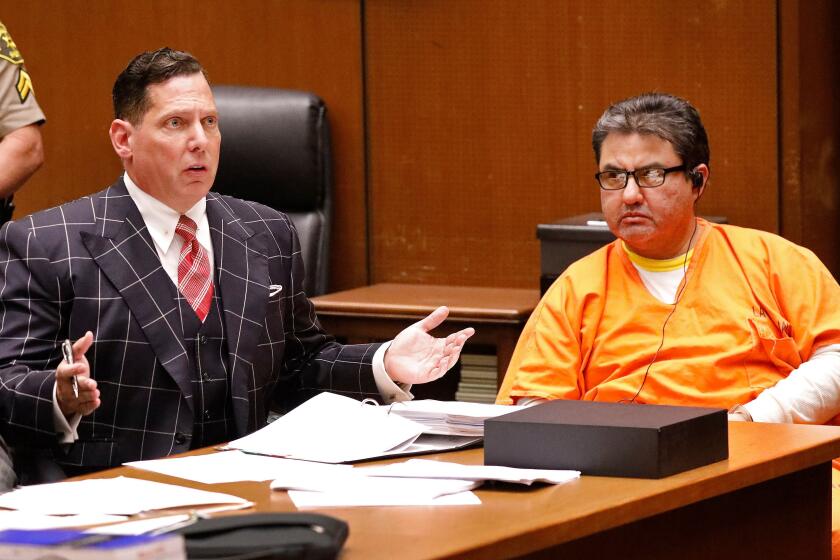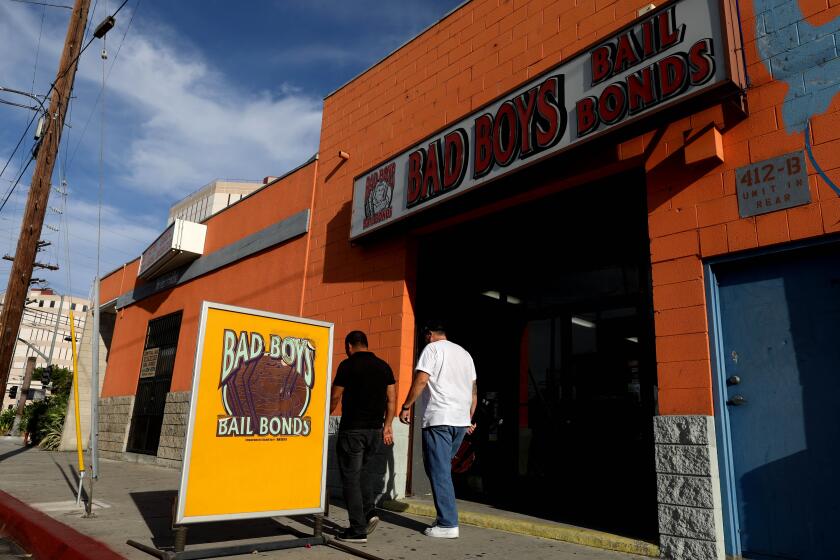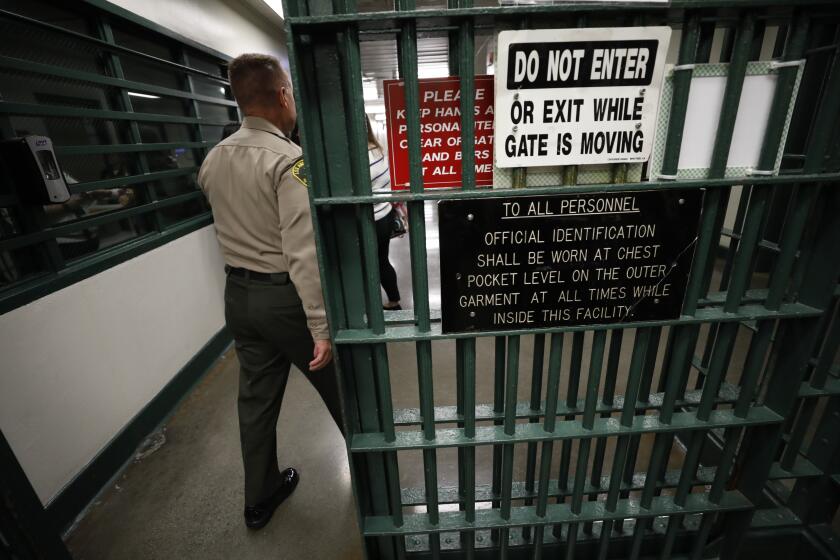Editorial: Trump should not have to pay bail
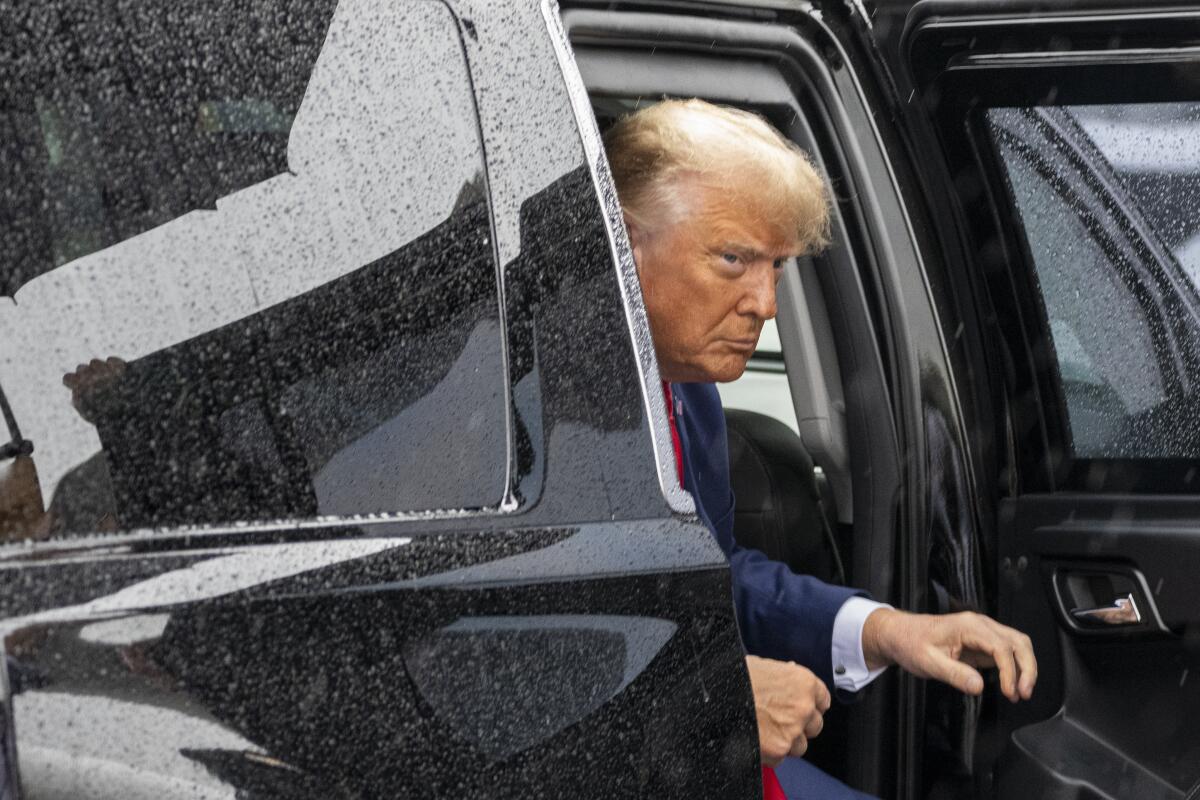
- Share via
Donald Trump is due to appear at the Fulton County jail in Atlanta on Thursday for the usual booking procedures for a person charged with multiple felonies: Surrender to authorities. Pose for a mug shot. Get fingerprinted. Undergo a medical exam. Pay bail.
Bail is set at $200,000, and as is typical in such cases, Trump is expected to pay 10% of that to a private bail agent or directly to the court. Several others charged along with Trump in the Georgia racketeering case over the attempt to overturn his 2020 election defeat have already appeared, paid and been released.
Bail was set at a stunning $25 million for Naason Joaquin Garcia after he was arrested last month at Los Angeles International Airport on charges of human trafficking and forcing children to perform sex acts.
But Trump shouldn’t have to pay. None of his co-defendants should have to pay.
No one, in fact, should ever have to pay cash bail. The system has strayed far from the original practice inherited from medieval England, where bail was a substitute for being jailed before trial. It was a security deposit to ensure the accused showed up in court, and it was fully refunded when they did. Today, in the U.S., bail is an unjust and nonsensical part of the criminal justice process that allocates treatment differently depending on how much money the accused has, not on their behavior, their risk to the public or their guilt.
Setting bail so high that the defendant can’t pay it undermines the criminal justice system. Only the rare defendant like Naasón Joaquín Garcia should be locked up before trial, and most should be released without money bail.
For Trump and others with ready access to money, bail is merely a charade — one that provides the comforting illusion that the rich and powerful are equal to the rest of us before the law, and are treated the same as others accused of crimes.
But that’s just silly. The notion that Trump’s $20,000 payment will determine whether he shows up for later proceedings is absurd. His money comes from political donors. Payment is a mere ritual.
California judges are circumventing a landmark constitutional ruling meant to stop the misuse of money bail. And it gets worse.
If he doesn’t violate his release conditions (including not pressuring witnesses) there is little prospect of him seeing the inside of a cell — at least not before trial. He won’t spend a night in the notorious Rice Street facility, where seven people have died this year, fights and stabbings are common, and the U.S. Department of Justice is investigating horrid conditions.
It’s a different matter for defendants without that kind of cash to throw around. For example, consider Lashawn Thompson, who was arrested last year for allegedly spitting on an officer and was sent to Fulton County jail because he could not afford his $2,500 bail for misdemeanor battery, or 10% of that to pay a bail agent who would promise to cover the full amount.
The Los Angeles Superior Court is wiping out money bail for many crimes. Evidence shows this makes the public safer, but people who should know better are likely to offer fact-free commentary about the change.
Thompson remained in the decrepit Rice Street dungeon for months, his already compromised mental health declining, his body attacked by beg bugs. If he had even a fraction of Trump’s money, he’d have gone home to be treated and to prepare a legal defense. But Thompson died in jail, never having gone to trial. He was accused only of spitting, not undermining democracy.
Montay Stinson faced a $3,000 bail when he was arrested on charges of second-degree burglary in October. Qualifying for bail meant that he was considered unlikely to flee or to injure anyone if released before trial. But because he couldn’t pay, he stayed locked up in the Rice Street facility. His body was found there earlier this month.
The L.A. County Superior Court is scaling back cash bail, but it was outclassed by the Illinois Supreme Court, which upheld legislation halting it altogether.
Alexander Hawkins was held on an unaffordable $5,000 bail on suspicion of shoplifting. He died in the Rice Street jail last week.
Thompson, Stinson and Hawkins were among hundreds of “pretrial” jail inmates in Fulton County — people who have not been convicted and who are not supposed to be punished, but merely held pending trial or other proceedings because they can’t pay bail. Those who survive the experience stand to lose jobs, access to essential medication and contact with their children. The loss is so profound, and the conditions under which they are held so abhorrent, that many plead guilty just to get out — even if they are innocent.
L.A. officials knew the bail schedules they used to lock people up before trial were unjust, but they didn’t act. Now a ruling will force them to do so.
Fulton County’s system for extracting either money or guilty pleas from the accused is the U.S. norm. Thirty people have died this year in Los Angeles County jails, where well over half the inmates in the overcrowded, inhumane facilities are held pretrial. Most pretrial detainees are not free to go home because — and only because — they don’t have money.
Trump is on the privileged flip side of that unjust wealth-based bail system. For him, bail is an easily affordable ransom that permits him to avoid the physical and psychiatric deterioration in store for people held in jail.
He shouldn’t have to pay it, because no one should have to pay it. It makes perfect sense for a judge to impose behavior-based release conditions on Trump or any other defendant. It makes no sense at all to make one of those conditions paying bail, which means virtually nothing to the rich, but loss of liberty, and sometimes life, to the poor.
More to Read
A cure for the common opinion
Get thought-provoking perspectives with our weekly newsletter.
You may occasionally receive promotional content from the Los Angeles Times.
